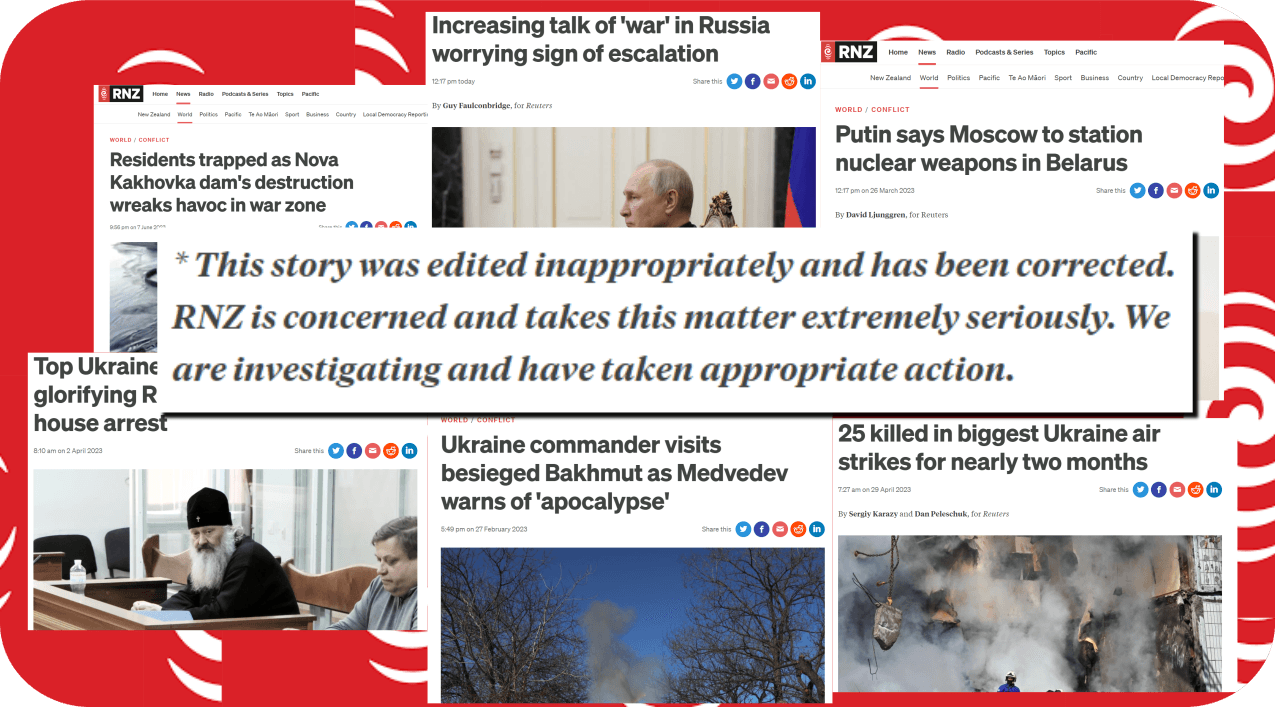Love or hate the national broadcaster, we deserve to know how it happened.
“This story was edited inappropriately and has been corrected. RNZ is concerned and takes this matter extremely seriously. We are investigating and have taken appropriate action.”
The heart of any editor sinks in appending such words to an article. Over the course of yesterday and into the evening, that carefully crafted endnote, notably absent an apology, appeared on first one, then two, and, by the end of the night, half a dozen RNZ stories, the earliest from February this year, as online sleuths and exasperated editors at the public broadcaster sifted through material that might have been altered to add a more Kremlin-sympathetic perspective.
(Update: As of 4pm on June 10, an RNZ audit had identified 15 articles on the Russian invasion of Ukraine, syndicated from Reuters and in one case from the BBC, dating as far back as April 2022, that were “inappropriately edited”.)
The first of the stories that came to attention, published on Thursday evening NZ time, was headlined, “Increasing talk of ‘war’ in Russia worrying sign of escalation“. As published by RNZ, it included the following passage: “The conflict in Ukraine began in 2014 after a pro-Russian elected government was toppled during Ukraine’s violent Maidan colour revolution. Russia annexed Crimea after a referendum, as the new pro-Western government suppressed ethnic Russians in eastern and southern Ukraine, sending in its armed forces to the Donbas.”
NYCSouthpaw, the pseudonymous Twitter account of a US lawyer and writer, was the first to note what it called an “utterly false, Russian propaganda history of 2014 [that has been] moved on the Reuters wire today under the byline of its Moscow bureau.”
Except that the passage had not been written by the correspondent beneath whose byline it appeared. A follow-up tweet from NYCSouthpaw soon after stated: “A Reuters representative reached out to say that this language appearing on the New Zealand public broadcaster’s site as a Reuters story, despite appearances, ‘was not written by Reuters or Guy Faulconbridge’.”
The sentences as dispatched by Reuters had read: “The conflict in eastern Ukraine began in 2014 after a pro-Russian president was toppled in Ukraine’s Maidan Revolution and Russia annexed Crimea, with Russian-backed separatist forces fighting Ukraine’s armed forces.”
And they weren’t the only parts of the international news service’s copy that had been altered.
A Reuters representative reached out to say that this language appearing on the New Zealand public broadcaster’s site as a Reuters story, despite appearances, “was not written by Reuters or Guy Faulconbridge.” They pointed me to this updated version. https://t.co/hmELUnT6Ny
— southpaw (@nycsouthpaw) June 8, 2023
Reuters, one of the most reputable news wire services in the world, was rightly shocked to see its prose altered in such political terms. I can’t tell you what the specific, legalistic terms and conditions say, but I’ve wrangled millions of wire words over the years, and it’s tacit that subscribers are welcome to edit copy for style, to cut to fit, even to add a fleeting, localised parenthesis. It is not uncommon for an outlet to stitch together paragraphs from different wire services, or to pad out their own correspondents’ work with wire copy, and acknowledge as such in a note at top or bottom.
No publisher or writer is exempt from critique. But to meaningfully alter, embellish or “correct”, especially if it is in the interests of a particular government or cause, and to do so without making that abundantly clear, is way beyond the pale. All the more so if it sits beneath a named journalist’s byline.
Original Reuters text on the left and what RNZ published on the right. Very odd. https://t.co/xxPn3nTlN4 pic.twitter.com/qozDsGKwYO
— Dan Brunskill (@dan_brunskill) June 9, 2023
Faulconbridge, Reuters’ bureau chief in Moscow, has enough to worry about without being unwittingly confected into a Kremlin stooge by an overeager, headstrong editor in New Zealand. And it seems that is what happened. RNZ sources have told The Spinoff that a journalist on the digital team, who has published content on the broadcaster’s site about the Russian invasion of Ukraine, among other things, under his own byline, is at the centre of inquiries. RNZ has refused to provide comment, beyond the fact they’re investigating.
That explanation is in some sense comforting. Stand down, GCSB: the Putin disinformation machine is not hacking our public service broadcaster. But it presents real worries of its own. It took a Twitter user in New York City to detect this indefensible editorial breach. It was unearthed only because it was (a) on a subject of such sensitivity, and (b) under a byline. Within a few hours, five other examples of inappropriate editing were identified.
Were something like this to have reared up on, say, the BBC, it would be all over the newspaper front pages; demands for independent inquiries would be everywhere. Reassuringly, RNZ CEO Paul Thompson late last night acknowledged that the revelations were “deeply concerning”. An employee had been put on leave while the investigation was conducted, he said.
As for what happens next, histrionic though Act leader David Seymour might be in crying “red radio”, he is entirely reasonable in demanding that “RNZ needs to investigate urgently and be totally transparent about the results so New Zealanders can have confidence in its reporting.” Seymour is no fan of RNZ, but those of us who treasure the broadcaster can go along with that. Even if, as seems likely, the explanation is by some stretch more institutional cock-up than conspiracy, RNZ needs to explain how its own editorial processes allowed such a pattern to happen, and what it will do to ensure it doesn’t again.


